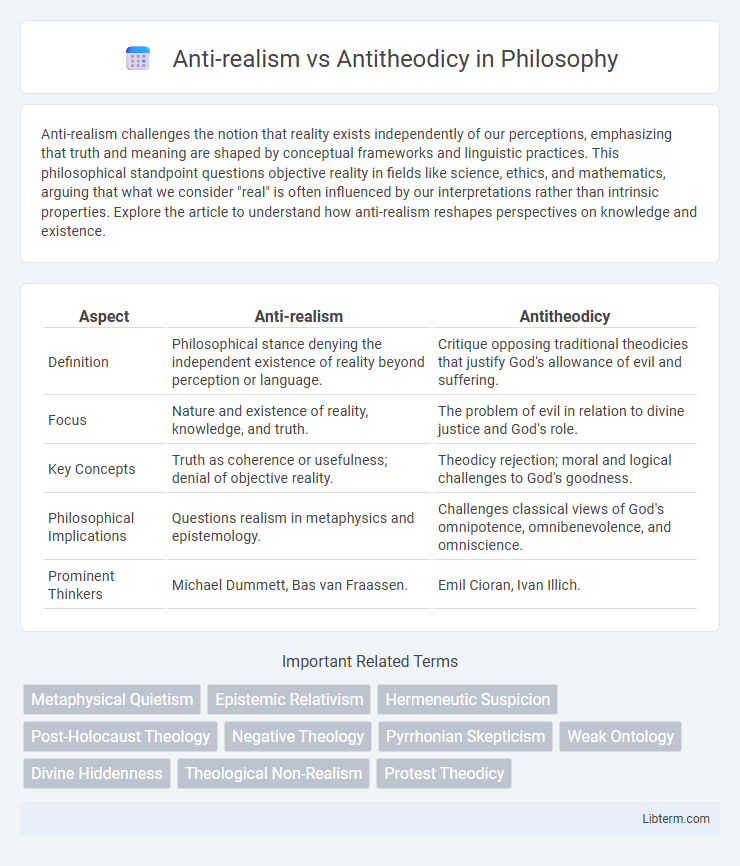Anti-realism challenges the notion that reality exists independently of our perceptions, emphasizing that truth and meaning are shaped by conceptual frameworks and linguistic practices. This philosophical standpoint questions objective reality in fields like science, ethics, and mathematics, arguing that what we consider "real" is often influenced by our interpretations rather than intrinsic properties. Explore the article to understand how anti-realism reshapes perspectives on knowledge and existence.
Table of Comparison
| Aspect | Anti-realism | Antitheodicy |
|---|---|---|
| Definition | Philosophical stance denying the independent existence of reality beyond perception or language. | Critique opposing traditional theodicies that justify God's allowance of evil and suffering. |
| Focus | Nature and existence of reality, knowledge, and truth. | The problem of evil in relation to divine justice and God's role. |
| Key Concepts | Truth as coherence or usefulness; denial of objective reality. | Theodicy rejection; moral and logical challenges to God's goodness. |
| Philosophical Implications | Questions realism in metaphysics and epistemology. | Challenges classical views of God's omnipotence, omnibenevolence, and omniscience. |
| Prominent Thinkers | Michael Dummett, Bas van Fraassen. | Emil Cioran, Ivan Illich. |
Defining Anti-Realism and Antitheodicy
Anti-realism in philosophy posits that the existence of certain entities or truths depends on conceptual schemes, perceptions, or linguistic frameworks rather than an objective reality independent of observers. Antitheodicy challenges traditional theodicy by rejecting the justification of evil through divine goodness or omnipotence, arguing that such reconciliations fail to address the actual presence of suffering. Both concepts critically examine reality and divine attributes, with anti-realism questioning ontological commitments and antitheodicy confronting theological explanations of evil.
Philosophical Foundations of Anti-Realism
Anti-realism challenges the notion that reality exists independently of our perceptions, emphasizing that truth and knowledge are constructed through linguistic and social frameworks. It contrasts with antitheodicy, which critiques traditional theodicies that attempt to justify divine goodness despite evil and suffering. Philosophical foundations of anti-realism include the rejection of objective metaphysical truths and the emphasis on epistemic relativism, highlighting the contingency of meaning and the interpretive nature of human understanding.
Theodicy and Its Critics: An Overview
Theodicy attempts to justify the coexistence of an omnipotent, omnibenevolent God with the presence of evil, but anti-realism challenges the objective existence of such divine attributes, undermining traditional theodical arguments. Antitheodicy rejects the attempt to rationalize evil through divine justification, emphasizing human suffering and the limits of theological explanations. Critics argue that theodicy often imposes unjust constraints on the nature of evil and divine action, prompting alternative views that question both the reality of God and the validity of theodical reasoning.
Antitheodicy: Origins and Core Arguments
Antitheodicy emerged as a critical response to traditional theodicies, challenging the justification of divine goodness amidst the existence of evil. Rooted in post-Holocaust theology and philosophers like Emmanuel Levinas and Jean-Luc Marion, antitheodicy rejects attempts to rationalize or explain suffering by appealing to a benevolent deity. Its core argument insists on acknowledging the irredeemable nature of evil without subsuming it under divine providence or cosmic justice frameworks.
Key Thinkers in Anti-Realism and Antitheodicy
Key thinkers in anti-realism include Nelson Goodman, who challenged the notion of objective truth through his theory of conceptual relativism, and Bas van Fraassen, notable for his constructive empiricism that denies the literal truth of scientific theories. In antitheodicy, philosophers like David Hume argue against traditional theodicies by emphasizing the problem of evil and the limitations of human reason to justify divine goodness. Thomas Nagel further critiques theodicy by highlighting the logical inconsistencies in reconciling suffering with an omnipotent, benevolent deity.
Ontological Commitments in Anti-Realism
Anti-realism involves minimal ontological commitments, positing that entities only exist relative to conceptual schemes or linguistic frameworks, rather than as mind-independent realities. This contrasts with antitheodicy, which challenges the justification of evil in a theistic ontology without denying the existence of a divine being. The ontological commitments in anti-realism emphasize the contingency and constructiveness of reality, rejecting metaphysical claims about objective existence upheld in traditional theodicy debates.
Ethical Implications of Antitheodicy
Antitheodicy challenges traditional theodicies by rejecting justifications for evil in the world, emphasizing ethical responsibility without appealing to divine reasons. This standpoint fosters a moral framework that prioritizes human suffering and accountability over theological explanations, prompting a commitment to justice and empathy independent of metaphysical beliefs. Ethical implications include a call for active resistance against injustice and cruelty, recognizing suffering as a profound moral concern beyond doctrinal defenses.
Comparative Analysis: Anti-Realism vs Antitheodicy
Anti-realism challenges the existence of objective values by denying that moral truths exist independently of human perceptions, whereas antitheodicy critiques and rejects any justification of evil within the framework of a benevolent deity. In comparative analysis, anti-realism emphasizes epistemological skepticism about moral facts, while antitheodicy centers on theological and metaphysical disputes about divine justice and the problem of evil. Both perspectives problematize traditional moral or theistic claims but approach the discourse through fundamentally different ontological assumptions concerning reality and divinity.
Contemporary Debates and Critiques
Contemporary debates on anti-realism versus antitheodicy center on the epistemological limits of divine knowledge and the problem of evil, with anti-realism challenging the objective truth claims about God's nature while antitheodicy rejects traditional justifications of divine goodness amid suffering. Critics argue that anti-realism weakens theological discourse by denying realist metaphysical commitments, whereas antitheodicy confronts the moral adequacy of theodicies, emphasizing human suffering's irreducibility. Current scholarship explores these tensions through analytic philosophy, hermeneutics, and phenomenology, highlighting the complex interplay between faith, reason, and ethical response to evil.
Impacts on Religious Philosophy and Theology
Anti-realism challenges the existence of objective religious truths, leading to a reinterpretation of faith as a subjective or socially constructed experience rather than an absolute reality. Antitheodicy critiques traditional attempts to justify divine goodness amidst evil, prompting theologians to reconsider the nature of God's justice and suffering. Both perspectives significantly impact religious philosophy by encouraging a shift from classical doctrines to more nuanced understandings of belief, morality, and divine attributes.
Anti-realism Infographic

 libterm.com
libterm.com